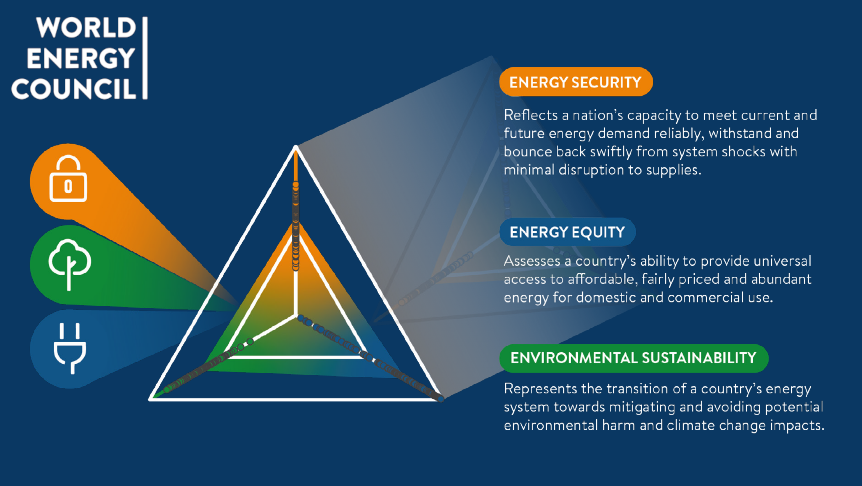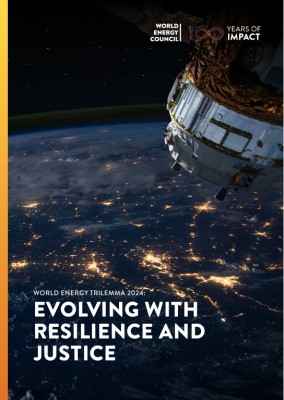Evolving the World Energy Trilemma to develop more resilient energy systems
All signs point to a world that will surpass 1.5 degrees of global warming in the near future. Other planetary boundaries are also in danger of imminent breach. We might get lucky, and sail past the 1.5 degrees and other markers without triggering any nasty tipping points, or perhaps we can adapt to whatever changes the planet throws back at us.
But that’s a big gamble. Urgent action, at all levels, is needed to avert the risk of catastrophe – and redesigning global energy systems is at the centre of this monumental challenge.
Over more than two hundred years we have built vast, complex, inter-connected systems to extract, distribute and convert fossil fuels to meet our energy needs - but it is no longer fit for purpose. Its design is inherently unsustainable. Partly because the stock of fossil fuel resources is ultimately finite, but more immediately because of the cumulative impact burning fossil fuels has on the climate.
A new system is required – one that preserves and maintains the reliable and affordable energy access much of the world depends on whilst simultaneously connecting the several hundred million people currently excluded from the modern energy economy.
That is the Energy Trilemma challenge in a nutshell – developing systems that serve us all running on energy that is secure, affordable and environmentally sustainable.
It is a huge challenge. We have plenty of techno-economic roadmaps that tell us how to re-engineer the plumbing of the energy system. But the scale and complexity of the implementation challenge is as daunting as the question of how best to accelerate the process.
Multiple energy transition pathways are emerging across the world, but none are on track to avoid an overshoot of planetary boundaries or to provide clean, affordable, and reliable energy access to billions more people. Making faster, fairer, and more far-reaching energy transitions happen is essential. But this is best achieved through 100s and 1000s of smaller steps and by involving more people and diverse communities in understanding their roles and choices.
And understanding what progress looks like as we radically reshape our energy systems requires tools to not only measure how far we’ve come but also point to where we need to go.
The good news is that we are not starting from scratch. The World Energy Trilemma Framework has been developed by the World Energy Council’s community over nearly 20 years to track country performance against the three dimensions of energy security, affordability and sustainability.

The World Energy Trilemma was initially conceived to balance the three pivotal dimensions. Energy security initially focused on safeguarding supply, avoiding shocks from scarcity or geopolitical tensions all the while ensuring the lights stayed on. Energy equity grappled with the key questions of energy access and affordability. Environmental sustainability advocated for practices that would reduce our carbon footprint and preserve the planet for future generations.
However, the Council has identified that the three dimensions are evolving to reflect new ambitions in managing energy for people and planet and the new threat of poly-crises. Energy security now encompasses the reliability of renewables, availability and accessibility or critical minerals, and resilience in the face of physical and cyber threats. Energy equity has deepened to include new demands for justice, fairer access to and equitable distribution of clean energy benefits, and energy transitions' impact on vulnerable communities. Environmental sustainability has broadened to a holistic concern for planetary health, embracing circular economy principles, the interconnectedness of water, food, and energy systems, and the better alignment of decarbonisation efforts with the planet’s ecological limits.
Our understanding of the interconnected nature of energy transitions and sustainable development continue to evolve with global environmental sciences and complexity thinking. It is bolstered, most importantly, through an exchange of practical experiences in managing increasingly diverse energy systems.
Our just-released 2024 World Energy Trilemma Report highlights these exciting developments as we puzzle out, together, the best way to retool the World Energy Trilemma Framework and its dimensions, extending its use and enabling real-time application through accessible data, new metrics, and expanded practical use of the tool beyond countries to regions and cities as a means of energy transition performance management and pathfinding.
Now in its 15th year, the World Energy Trilemma Framework is recognised as a valuable tool to navigate and accelerate energy transitions around the world, and will drive many sessions at our 26th World Energy Congress in Rotterdam. As the world’s energy leaders convene under the same roof, 22-25 April, there has never been a more ideal opportunity to harness their collective knowledge and expertise to build a better tool to track energy transitions.
Read more about the 2024 World Energy Trilemma Report here.
Downloads

FULL REPORT | World Energy Trilemma 2024 Report
Download PDF





